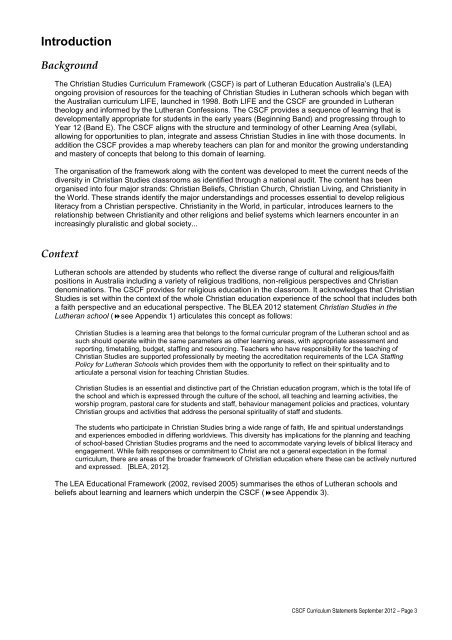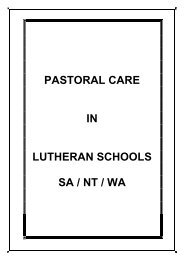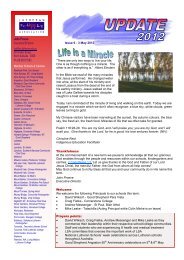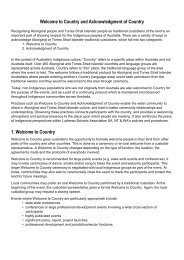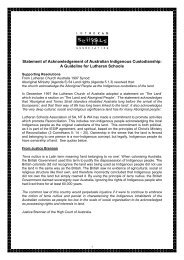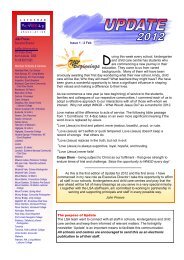2012 CSCF Curriculum Statements.pdf - Lutheran Schools ...
2012 CSCF Curriculum Statements.pdf - Lutheran Schools ...
2012 CSCF Curriculum Statements.pdf - Lutheran Schools ...
You also want an ePaper? Increase the reach of your titles
YUMPU automatically turns print PDFs into web optimized ePapers that Google loves.
IntroductionBackgroundThe Christian Studies <strong>Curriculum</strong> Framework (<strong>CSCF</strong>) is part of <strong>Lutheran</strong> Education Australia’s (LEA)ongoing provision of resources for the teaching of Christian Studies in <strong>Lutheran</strong> schools which began withthe Australian curriculum LIFE, launched in 1998. Both LIFE and the <strong>CSCF</strong> are grounded in <strong>Lutheran</strong>theology and informed by the <strong>Lutheran</strong> Confessions. The <strong>CSCF</strong> provides a sequence of learning that isdevelopmentally appropriate for students in the early years (Beginning Band) and progressing through toYear 12 (Band E). The <strong>CSCF</strong> aligns with the structure and terminology of other Learning Area (syllabi,allowing for opportunities to plan, integrate and assess Christian Studies in line with those documents. Inaddition the <strong>CSCF</strong> provides a map whereby teachers can plan for and monitor the growing understandingand mastery of concepts that belong to this domain of learning.The organisation of the framework along with the content was developed to meet the current needs of thediversity in Christian Studies classrooms as identified through a national audit. The content has beenorganised into four major strands: Christian Beliefs, Christian Church, Christian Living, and Christianity inthe World. These strands identify the major understandings and processes essential to develop religiousliteracy from a Christian perspective. Christianity in the World, in particular, introduces learners to therelationship between Christianity and other religions and belief systems which learners encounter in anincreasingly pluralistic and global society...Context<strong>Lutheran</strong> schools are attended by students who reflect the diverse range of cultural and religious/faithpositions in Australia including a variety of religious traditions, non-religious perspectives and Christiandenominations. The <strong>CSCF</strong> provides for religious education in the classroom. It acknowledges that ChristianStudies is set within the context of the whole Christian education experience of the school that includes botha faith perspective and an educational perspective. The BLEA <strong>2012</strong> statement Christian Studies in the<strong>Lutheran</strong> school (see Appendix 1) articulates this concept as follows:Christian Studies is a learning area that belongs to the formal curricular program of the <strong>Lutheran</strong> school and assuch should operate within the same parameters as other learning areas, with appropriate assessment andreporting, timetabling, budget, staffing and resourcing. Teachers who have responsibility for the teaching ofChristian Studies are supported professionally by meeting the accreditation requirements of the LCA StaffingPolicy for <strong>Lutheran</strong> <strong>Schools</strong> which provides them with the opportunity to reflect on their spirituality and toarticulate a personal vision for teaching Christian Studies.Christian Studies is an essential and distinctive part of the Christian education program, which is the total life ofthe school and which is expressed through the culture of the school, all teaching and learning activities, theworship program, pastoral care for students and staff, behaviour management policies and practices, voluntaryChristian groups and activities that address the personal spirituality of staff and students.The students who participate in Christian Studies bring a wide range of faith, life and spiritual understandingsand experiences embodied in differing worldviews. This diversity has implications for the planning and teachingof school-based Christian Studies programs and the need to accommodate varying levels of biblical literacy andengagement. While faith responses or commitment to Christ are not a general expectation in the formalcurriculum, there are areas of the broader framework of Christian education where these can be actively nurturedand expressed. [BLEA, <strong>2012</strong>].The LEA Educational Framework (2002, revised 2005) summarises the ethos of <strong>Lutheran</strong> schools andbeliefs about learning and learners which underpin the <strong>CSCF</strong> (see Appendix 3).<strong>CSCF</strong> <strong>Curriculum</strong> <strong>Statements</strong> September <strong>2012</strong> – Page 3


